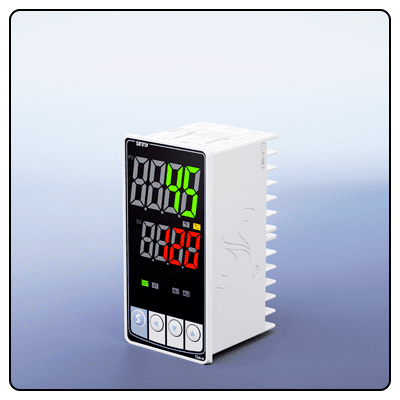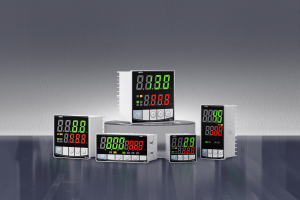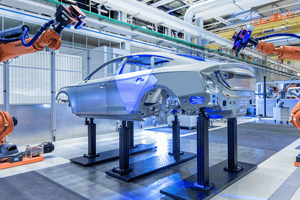Learn the Role of Industrial Temperature Controllers to Increase Safety
Industrial temperature controllers are vital in increasing efficiency and safety in industrial settings. Still, many need help understanding their types, key features, applications, or benefits - or how best to select one! Here is your chance to do just that!
1. Introduction
In industrial environments, maintaining accurate temperature regulation is vital to efficiency, safety, and product quality. Temperature controllers play an essential role in controlling temperatures to an appropriate range; in this article, we cover their importance, types, key features, applications, benefits, and tips for choosing one.
2. Types of Industrial Temperature Controllers
Analog Temperature Controllers: Despite their reputation, analog temperature controllers remain popular due to their simplicity and robustness when controlling essential temperature needs only need be sufficient. These controllers can easily be operated or maintained, making them ideal for environments without advanced features.
Digital Temperature Controllers: Digital temperature controllers offer greater precision and programmability than their analog counterparts, boasting digital displays and advanced control algorithms that regulate more precisely. It is ideal for applications requiring accurate temperature regulation while easily integrating into other digital systems.
PID Temperature Controllers: PID (Proportional-Integral-Derivative) temperature controllers are specifically tailored for complex processes requiring precise and stable temperature regulation, using proportional, integral, and derivative actions to keep temperatures within specified parameters. They're best used in chemical processing or pharmaceutical manufacturing where temperature stability is essential - these versatile controllers make an excellent addition.
3. Key Attributes of Effective Temperature Controllers
Accuracy and Precision: Accurate temperature controls with advanced control algorithms and high-resolution sensors are necessary for process stability and product quality assurance.
Reliability and Durability: Temperature controllers used in industrial settings must be reliable and long-lasting to withstand rigorous environments, so when selecting one, make sure its construction includes robust features to protect it against failures in service. This way, you ensure uninterrupted operations.
User Interface and Programmability: Accessible user interface and programmability are integral for efficient system operation. Controllers that feature intuitive displays with easily configurable settings help operators quickly configure and monitor systems, while advanced features like remote monitoring can further increase usability.

4. Applications of Temperature Controllers in Different Industries
Food and Beverage Industry: In the food and beverage industries, temperature controllers play an integral part in product quality control, safety compliance, and consistency across processes like pasteurization, fermentation, and refrigeration - by keeping temperatures consistent across these steps, manufacturers can ensure their products comply with industry safety requirements while meeting compliance standards that ensure its high standards are upheld.
Pharmaceutical Industry: Temperature control is critical in maintaining product efficacy and stability. Temperature controllers are used in drug formulation, storage, and transportation processes - maintaining precise temperatures helps avoid degradation while guaranteeing the continued effectiveness of pharmaceutical products.
Chemical Processing: Temperature controllers play an essential role in chemical processing by providing precise temperature regulation to meet safety regulations during operations and optimize reaction rates and yields while increasing process efficiency and product quality - while remaining compliant with laws. With their precision regulation capabilities, temperature controllers allow manufacturers to maintain safe processes at peak productivity levels and increase yield rates through improved reaction yield rates while remaining compliant with laws and operating legally and safely.
5. Benefits of Industrial Temperature Controllers
Process Stability: Temperature controllers play an invaluable role in manufacturing process stability by helping maintain consistent product quality through more stable temperatures, thus decreasing variation during manufacturing and creating more predictable outcomes.
Temperature Controllers Can Improve Efficiency and Productivity: Temperature controllers can boost efficiency and productivity by optimizing operations and decreasing downtime. Precise temperature regulation ensures equipment runs optimally, decreasing malfunction risk while increasing throughput.
Energy Savings: Temperature controllers contribute to greater energy efficiency by keeping optimal temperatures throughout, thus decreasing consumption and operational costs and supporting environmental sustainability by reducing emissions.
Temperature Controllers Enhance Safety: Temperature controllers help minimize accidents by maintaining stable temperatures - decreasing risks related to overheating or other temperate incidents, complying more quickly with safety standards, protecting workers and equipment more efficiently, etc.
Environmental Sustainability: Efficient temperature controls can significantly decrease emissions and their ecological footprint by optimizing processes, increasing efficiency, and supporting eco-friendly manufacturing practices. Temperature controllers play an essential part in supporting sustainability within manufacturing practices.
6. How to Choose the Right Temperature Controller
Assess Application Requirements: When you purchase a temperature controller, please carefully assess its specific application by considering these aspects, such as range, accuracy, and precision requirements - these vary widely among applications. Still, the controller you buy must satisfy them all.
Environment Affecting Purchase Decision: Environmental conditions should be vital when choosing an ideal temperature controller. Consider factors like extremes in temperature or humidity levels and exposure to dust or chemicals when selecting one that will deliver reliable performance.
Evaluating Budget and Long-term Value: Budget should always come first when purchasing a temperature controller. Initial costs and long-term value, such as maintenance expenses or increasing productivity, must all be assessed carefully when making this critical investment.
7. Installation and Maintenance Tips
Proper installation is critical for the appropriate functioning of temperature controllers. Please follow all manufacturer recommendations when setting up the temperature controllers with secure connections at each junction point for reliable operations and potential problem avoidance.
Regular Maintenance: Regular checks and calibration are critical in protecting temperature controllers over their long lifespan, helping identify potential issues early and address them before they lead to more significant problems. Regular audits and calibrations help detect issues quickly before they become more prominent.
Troubleshooting Common Issues with Temperature Controllers: Recognizing and correcting common problems associated with temperature controllers can ensure optimal functioning, such as sensor malfunctions, wiring problems, calibration errors, or discrepancies - quickly addressing these issues can reduce downtime while maintaining consistent temperature regulation.
8. Conclusion
Temperature controllers are indispensable in many industries, providing process stability, productivity growth, and energy savings while contributing to environmental sustainability. By understanding various types of controllers and their features and applications, manufacturers can select an ideal device suited for their particular requirements and install it properly with ongoing maintenance for maximum performance and longevity of temperature controls.
11. FAQs
Q1. What Is an Industrial Temperature Controller (ITC)?
A1. An industrial temperature controller (ITC) is designed to maintain ideal temperatures within specified parameters across numerous industrial processes.
Q2: Why can temperature controllers enhance process efficiency?
A2: Temperature controllers keep exact temperatures consistent across processes to increase overall productivity while decreasing downtime and saving resources in terms of labor cost and downtime costs.
Q3: What factors should I consider when purchasing a temperature controller?
A3: When shopping for temperature controls, consider accuracy, reliability, ease of use, integration capabilities, and budgetary restrictions.
Q4: Can temperature controllers help me save on energy costs?
A4: Absolutely; by maintaining ideal temperatures and thus decreasing energy use, temperature controllers reduce consumption, resulting in lower bills and operational expenses.
Q5: Which advanced features should I look for when purchasing a temperature controller?
A5: Additional advanced features to watch for include autotuning, adaptive control, remote monitoring capabilities, and support for various communication protocols.
- The Benefits of Using Industrial Temperature Controllers in Manufacturing
- Innovations in Industrial Temperature Control Technology





















